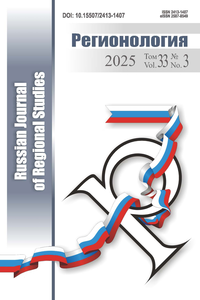A. V. Shadrikov. Reproductive Attitudes of Young Rural Women in the Republic of Tatarstan
UDK 618.179:614.2:711.43(470.41)
DOI: https://doi.org/10.15507/2413-1407.106.027.201901.122-137
Introduction. The modern rural society suffers a demographic crisis due to a drop in the birth rate and a decrease in the total fertility rate. Young women of reproductive age play an important role in increasing the number of births in rural areas. The objective of the paper is to study the reproductive intentions and preferences of young rural women in the Republic of Tatarstan as well as to identify the reasons for birth postponement and the degree of influence of the state support measures.
Materials and Methods. The results of a sociological survey conducted in the Republic of Tatarstan in 2018 were used as the materials for the study. Statistics were used for the calculation; the systematic and comparative methods of analysis were employed.
Results. The study has revealed the sustainable subjective preferences of young rural women in the Republic of Tatarstan to have two or more children. It has also confirmed the heterogeneity of the reproductive attitudes in the rural community and identified the rural women’s reasons for birth postponement. Assessment of certain reserves of increasing the birth rate has been made. State support measures affecting fertility rates have been evaluated.
Discussion and Conclusion. The increase in the birth rate in the Republic of Tatarstan largely depends on the quantitative and qualitative indicators such as the number of rural women of reproductive age as well as on the measures taken by the state to stimulate the birth rate and thereby increase the reproductive attitudes. The research materials will be useful for the heads of municipal districts, heads of governmental structures, scholars and helpful when devising federal and regional demographic and family development strategies as well as when implementing the Demography national project.
Keywords: fertility, young rural woman, reproductive intentions, motivation resource, model of an ideal family, reproductive preferences, government measures to increase fertility, demography, Republic of Tatarstan
REFERENCES
1. Kutyavina E.E., Kuramshin A.V., Miftakhova A.G. Responsible Reproduction of the Modern Woman. Vestnik Nizhegorodskogo universiteta im. N. I. Lobachevskogo = Vestnik of Lobachevsky University of Nizhny Novgorod. 2014; (2):81-87. Available at: https://elibrary.ru/item.asp?id=22612445 (accessed 14.10.2018). (In Russ.)
2. Arkhangelskiy V.N., Zinkina Yu.V., Korotaev A.V., Shulgin S.G. Modern Fertility Trends in Russia and the Impact of the Pro-Natalist Policies. Sotsiologicheskie issledovaniya = Sociological Studies. 2017; (3):43-50. Available at: http://socis.isras.ru/en/article/6597 (accessed 14.10.2018).
3. Arkhangelskiy V.N. [Reproductive and Marital Behavior]. Sotsiologicheskie issledovaniya = Sociological Studies. 2013; (2):129-136. Available at: http://www.isras.ru/socis_2013_02.html (accessed 14.10.2018). (In Russ.)
4. Nivorozhkina L.I., Ovcharova L.N., Abazieva K.G. Social-Economic Factors of Birth Rate Growth in Russia. Vestnik Rostovskogo gosudarstvennogo ehkonomicheskogo universiteta = Vestnik of Rostov State University of Economics. 2010; (2):12-21. Available at: https://old.rsue.ru/vestnik/archive.aspx?lang=ru (accessed 14.10.2018). (In Russ.)
5. Shakhotska L.P. Implementation of the Demographic Security Programs and Evaluation of their Effectiveness in the Republic of Belarus. Voprosy statistiki = Statistics Issues. 2016; (9):38-48. Available at: https://voprstat.elpub.ru/jour/article/view/387 (accessed 14.10.2018). (In Russ.)
6. Heiland F., Prskawetz A., Sanderson W.C. Are Individuals’ Desired Family Sizes Stable? Evidence from West German Panel Data. European Journal of Population. 2008. (24):129-156. DOI: https://doi.org/10.1007/s10680-008-9162-x
7. Fürnkranz-Prskawetz A., Sobotka T., Buber-Ennser I., Engelhardt-Wölfler H., Gisser R. Austria: Persistent low fertility since the m id-1980s. Demographic Research. 2008; 19(12):293-360. DOI: https://doi.org/10.4054/DemRes.2008.19.12
8. Kalachikova O.N. Socio-Hygienic Literacy in the System of Formation of Population’s Reproductive Behavior. Problemy razvitiya territorii = Problems of Territory’s Development. 2011; (2):64-71. Available at: http://pdt.vscc.ac.ru/article/874 (accessed 14.10.2018). (In Russ.)
9. Volchenkova E.V. Peculiarities in Reproduction Attitudes of Modern Youth. Vestnik Vyatskogo gosudarstvennogo gumanitarnogo universiteta = Herald of Vyatka State University. 2014; (8):21-25. Available at: http://vestnik43.ru/vggu-arhiv-jurnala (accessed 14.10.2018). (In Russ.)
10. Tyndik A.O. Reproductive Attitudes and Their Realization in Modern Russia. Zhurnal issledovaniya sotsialnoj politiki = The Journal of Social Policy Studies. 2012; (3):361-376. Available at: https://jsps.hse.ru/article/view/3471 (accessed 14.10.2018). (In Russ.)
11. Beginina I.A., Kalugina T.A. The Peculiarities of Rural Women’s Reproductive Goals. Izvestiya Saratovskogo universiteta. Novaya seriya. Seriya: Sotsiologiya. Politologiya = Izvestiya Saratovskogo Universiteta. New series. Series: Sociology. Politology. 2018; 18(4):413-418. (In Russ.) DOI: https://doi.org/10.18500/1818-9601-2018-18-4-413-418
12. Reshetnikova S.A. Impact of Social Support Institutes on Social Position of Rural Young Families in the Altai Territory in 2000s. Izvestiya Аltajskogo gosudarstvennogo universiteta = Izvestiya of Altai State University. 2011; (2/2):241-245. Available at: http://izvestia.asu.ru/2011/2-2/soci/05.ru.html (accessed 14.10.2018). (In Russ.)
13. Frejka T. Parity Distribution and Completed Family Size in Europe: Incipient Decline of the Two-Child Family Model? Demographic Research. 2008; 19:47-72. DOI: https://doi.org/10.4054/DemRes.2008.19.4
14. Ermisch J., Ogawa N. The Family, the Market and the State in Ageing Societies. Oxford, England: Clarendon Press. 2007; 79-104. Available at: https://www.amazon.com/Family-Societies-International-Studies-Demography... (accessed 14.10.2018).
15. Gauthier А. The Impact of Family Policies on Fertility in Industrialized Countries: A Review of the Literature. Population Research and Policy Review. 26(3):323-346. DOI: https://doi.org/10.1007/s11113-007-9033-x
Submitted 04.11.2018; accepted for publication 13.12.2018; published online 29.03.2019.
About the author:
Alexander V. Shadrikov, Scientific Worker, Center of Advanced Economic Research in the Tatarstan Academy of Sciences (23/1 Ostrovskogo St., Kazan 420111, Russia), ORCID: https://orcid.org/0000-0003-2194-2358, Researcher ID: http://www.researcherid.com/rid/X-5832-2018, aleksandr.shadrikov@tatar.ru
For citation:
Shadrikov A.V. Reproductive Attitudes of Young Rural Women in the Republic of Tatarstan. Regionologiya = Regionology. 2019; 27(1):122-137. DOI: https://doi.org/10.15507/2413-1407.106.027.201901.122-137
The author has read and approved the final version of the manuscript.

Материалы журнала "РЕГИОНОЛОГИЯ REGIONOLOGY" доступны по лицензии Creative Commons «Attribution» («Атрибуция») 4.0 Всемирная
















